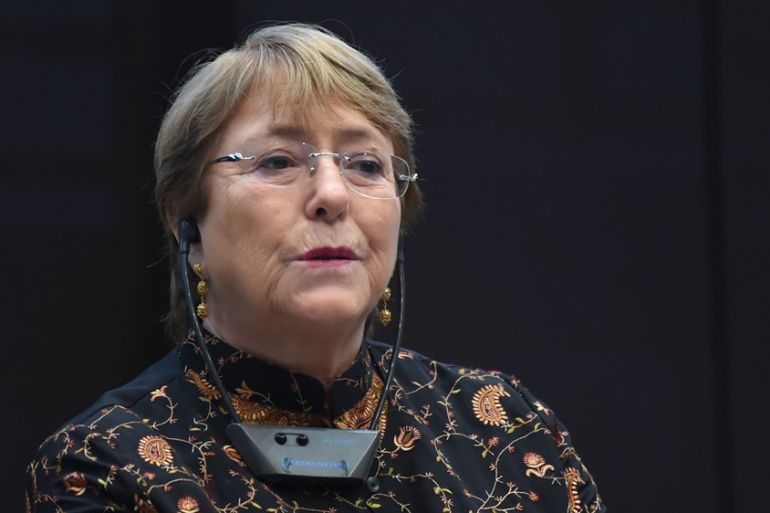UN rights chief Bachelet heads to Venezuela for a three-day visit
Bachelet is expected to hold separate talks with President Nicolas Maduro and opposition leader Juan Guaido.

UN human rights chief Michelle Bachelet is set to arrive in Venezuela on Wednesday for a three-day visit where she is expected to hold separate talks with both President Nicolas Maduro and opposition leader Juan Guaido.
She is also expected to speak to civil society leaders and “victims of human rights violence and abuses”, the UN rights office said.
Keep reading
list of 4 itemsPalestinian Prisoner’s Day: How many are still in Israeli detention?
‘Mama we’re dying’: Only able to hear her kids in Gaza in their final days
Europe pledges to boost aid to Sudan on unwelcome war anniversary
Her visit, at the invitation of the government, comes in advance of a UN Human Rights Council three-week session.
The trip also comes as a critical time for the country. It has been nearly six months since Guaido invoked the Constitution to declare himself interim president, calling Maduro’s 2018 re-election illegitimate.
Dozens of countries, including the United States and many of Venezuela’s regional neighbours, have recognised the opposition leader as the country’s leader. Maduro, who maintains the backing of Russia, China and Cuba, as well as most of Venezuela’s state institutions including the military, accuses Guaido and the US of staging a coup.
Bachelet will deliver a statement at the end of her visit on June 21, and she is also expected to submit a report to the UN Human Rights Council in the next month.
Good for Maduro?
In recent months, the rights chief has been critical of Maduro’s crackdown on opponents. In a report to the UN Human Rights Council in March, Bachelet said Venezuelan security forces, backed by pro-government armed groups, had quashed peaceful protests with excessive use of force, killings and torture.
She has also criticised US sanctions against Maduro’s government, cautioning that they are exacerbating the crisis and possibly hurting “people’s basic rights and well being”.
Some analysts believe her visit will reflect positively for Maduro.
“With this visit the UN Commissioner, indirectly, recognises the legitimacy of the government of Nicolas Maduro,” said Luis Vicente from Datanalisis, a think-tank in Venezuela.
“To an isolated government, such as the one of Nicolas Maduro, that doesn’t have the support of an important part of the international community, it serves him to have a representative of the United Nations in the country,” Vicente told Al Jazeera. “It seems to me that this recognition is better for the government than the cost of the report, in which of course there will be criticism of human rights and of the situation in Venezuela.”
Opposition politician released
Prior to Bachelet’s visit, the government released an opposition legislator who spent nearly two months behind bars.
Gilber Caro, 45, had been in custody since his arrest by intelligence agents on April 26. He was arrested just before a failed April 30 uprising when Guaido appeared in a video surrounded by about more than two dozen military personnel.
“The deputy Gilber Caro never should have been imprisoned. Today, he is out from behind bars but like all Venezuelans still has no freedom,” the opposition-controlled National Assembly said on Twitter.
The UN last month criticised the Maduro government’s handling of Caro’s arrest, saying its failure to confirm his fate and whereabouts constituted an “enforced disappearance” under international law.
Rights group Penal Forum said Melvin Farias and Junior Rojas, two men it called political prisoners and said had been jailed for more than a year, had also been freed.
Several politicians close to Guaido who have been arrested in recent weeks remain behind bars, including his chief of staff Roberto Marrero and National Assembly Vice President Edgar Zambrano.
“In Venezuela, the political game is locked,” said Jose Meza, a Venezuelan analyst and journalist.
“The real game is taking place outside the country, with the current talks between the great powers, and the contact groups,” he told Al Jazeera.
“In this context, this visit can bring options that could end leading to intermediate points of negotiation,” he added. “With our current politicians any option of negotiation is complex, perhaps this visit can open new spaces, and could end detonating an important opportunity.”
According to the UN, more than four million Venezuelans have left the country in recent years, fleeing violence, hyperinflation, unemployment and food and medicine shortages. Earlier this year, the country faced numerous power outages, exacerbating issues within the country’s already failing infrastructure.
The UN refugee agency said the number of Venezuelan refugees and migrants rose by one million after November, indicating a rapid escalation in the months since dozens of countries recognised Guaido as the country’s interim leader.
With additional reporting by Elizabeth Melimopoulos.